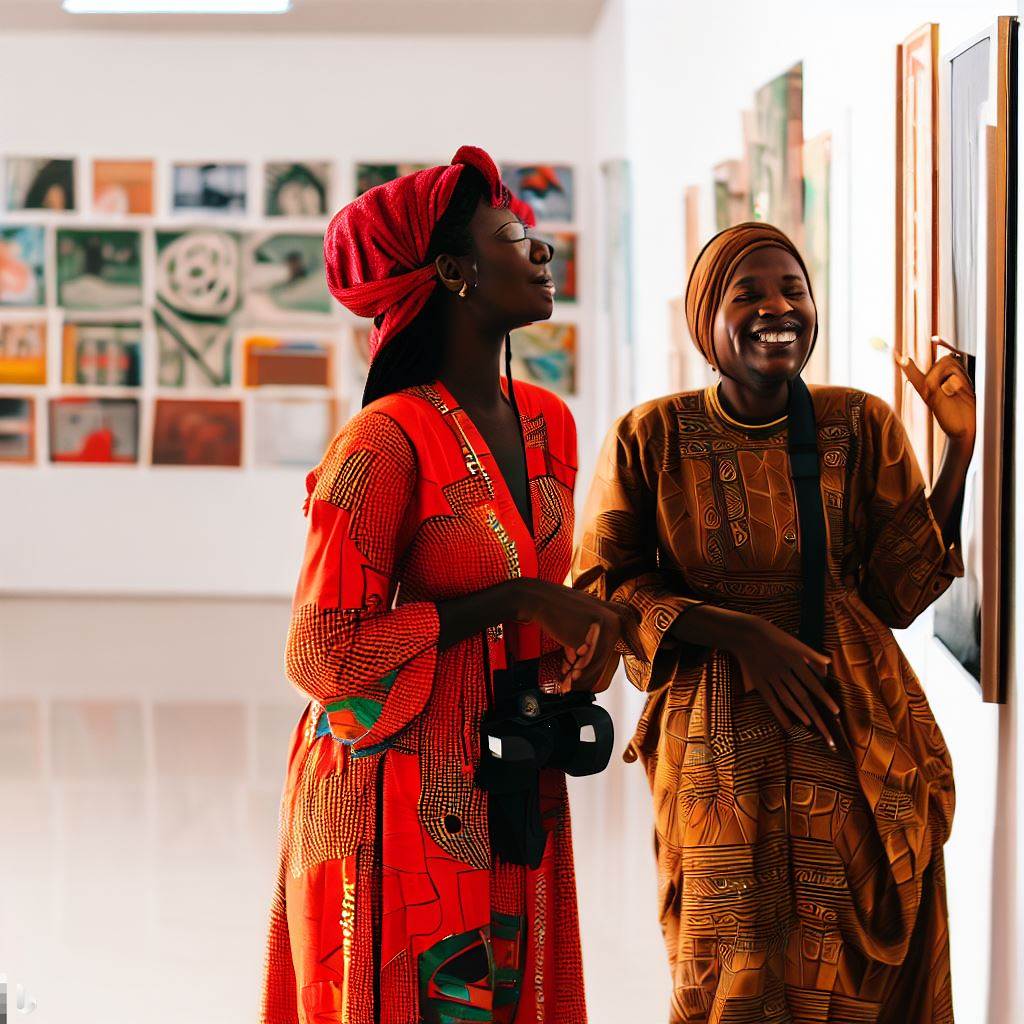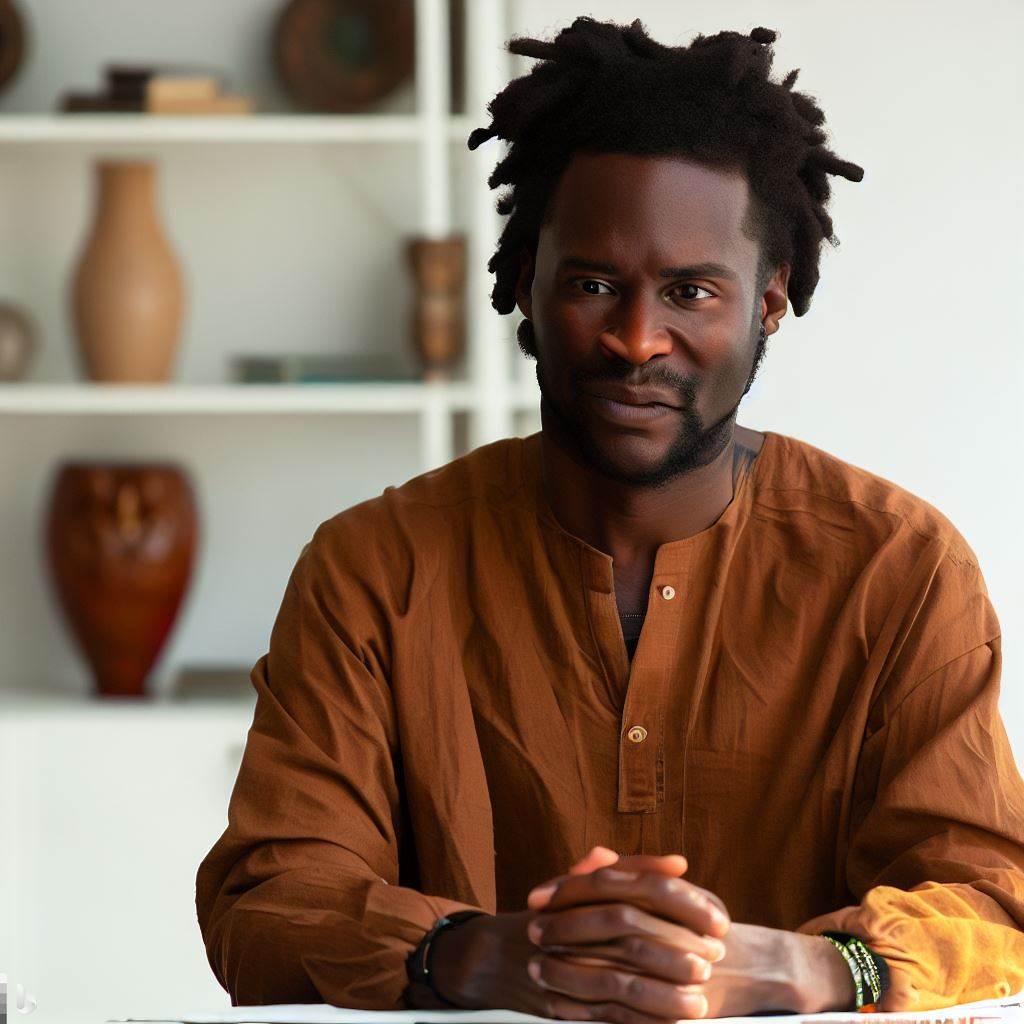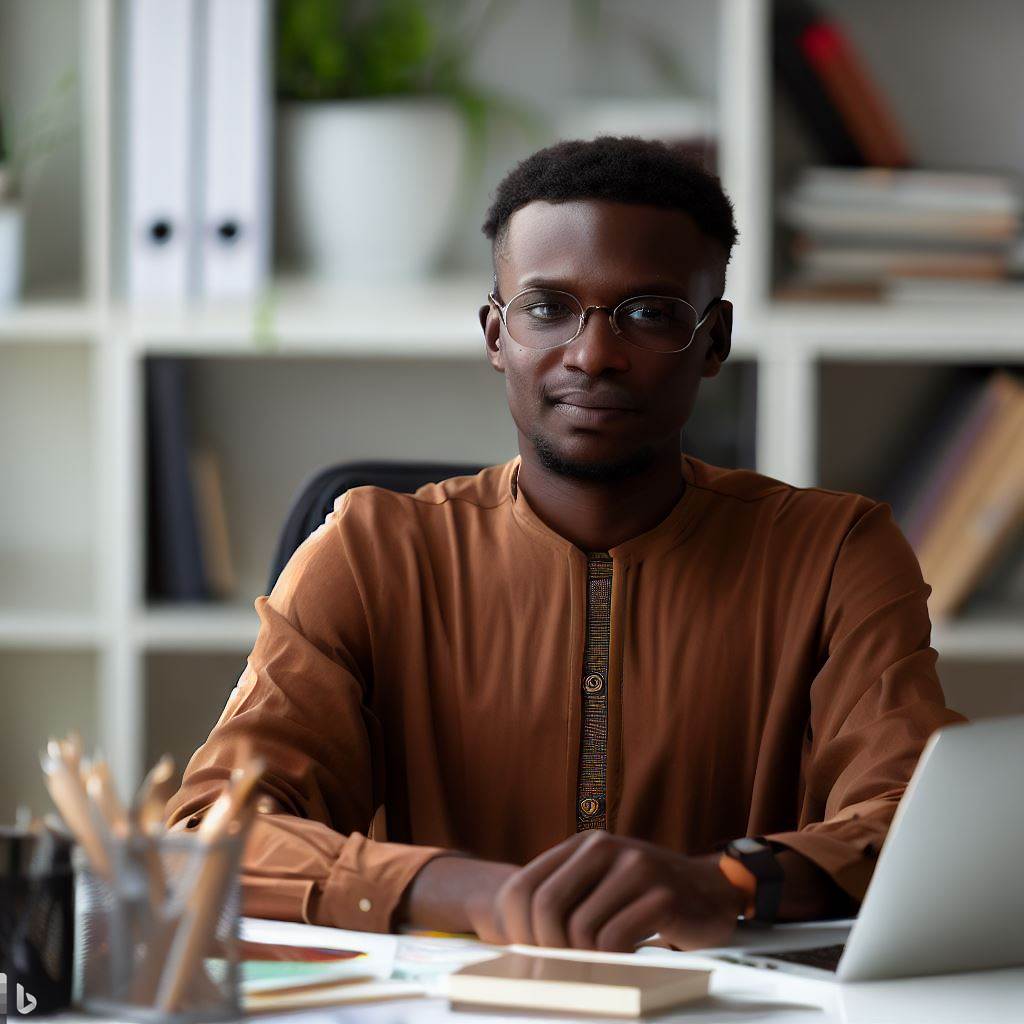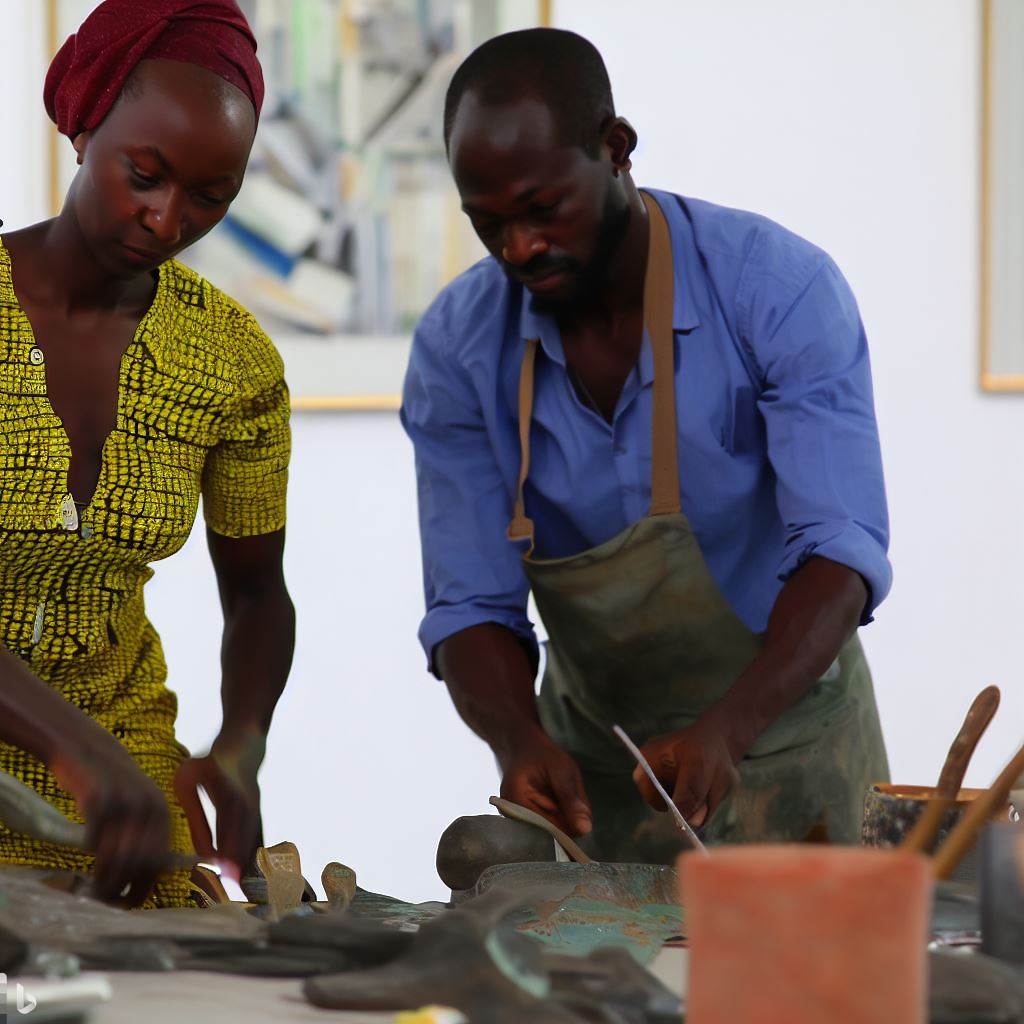Introduction
Women curators in Nigeria have made significant strides in the art world, breaking cultural barriers and defying societal norms.
This blog post explores the importance of their contributions and argues that their presence not only amplifies diverse voices but also provides a platform for the redefinition of Nigerian art.
Briefly introduce the topic of women curators in Nigeria
In a society deeply rooted in patriarchal values, women curators in Nigeria face numerous challenges.
However, their determination and passion have allowed them to overcome societal barriers and establish themselves as respected figures in the art community.
Breaking cultural barriers is crucial in this field as it challenges the dominant narrative and expands the definition of art.
By reclaiming their space, women curators are introducing new perspectives and challenging long-held beliefs about the role of women in Nigerian society.
stating the main argument of the blog post
The main argument of this blog post is that by actively participating in the art scene, women curators are not only reshaping the industry but also fighting for gender equality and female empowerment in Nigeria.
Their work not only challenges traditional gender roles but also encourages other Nigerian women to pursue careers in the arts.
Through interviews and case studies of successful women curators, this blog post will shed light on their experiences, accomplishments, and the impact they have on the art community.
By showcasing their achievements, we hope to inspire more women to break cultural barriers and pursue their dreams as curators in Nigeria.
The presence of women curators in Nigeria is instrumental in breaking cultural barriers and redefining the art landscape.
Their efforts not only challenge societal norms but also pave the way for a more inclusive and diverse art community.
By amplifying their voices, we can ensure that Nigerian art reflects a true representation of its rich cultural heritage.
Background on Women Curators in Nigeria
In the historical context of women curators in Nigeria, women have been underrepresented in this profession.
Notable women curators who have made significant contributions in Nigeria include Enid Schildkrout, Peju Layiwola, and Okwui Enwezor.
The challenges faced by women curators in Nigeria are primarily related to the male-dominated nature of the profession.
Historical Context of Women Curators in Nigeria
In the field of art curation, women in Nigeria have faced significant challenges throughout history.
The profession has been largely dominated by men, leaving women with limited opportunities to showcase their talents and expertise.
Notable Women Curators and Their Contributions
- Enid Schildkrout: Enid Schildkrout is a renowned curator who has made significant contributions to the field of art in Nigeria.
Her work focuses on African arts and culture, particularly the textiles and fashion of the Nigerian people.
She has organized numerous exhibitions and curated collections that highlight the rich cultural heritage of the country. - Peju Layiwola: Peju Layiwola is another notable woman curator from Nigeria.
Her work revolves around the exploration of traditional Nigerian art forms and their relevance in contemporary society.
She has played a crucial role in preserving and promoting Nigerian cultural heritage through her curatorial projects and research. - Okwui Enwezor: Although not a Nigerian herself, Okwui Enwezor’s impact on the Nigerian art scene cannot be ignored.
As a curator, he championed African art and artists on the global stage, providing a platform for Nigerian curators and artists to showcase their work internationally.
The Challenges Faced by Women Curators in Nigeria
- Gender Bias: One of the main challenges faced by women curators in Nigeria is the pervasive gender bias within the profession.
This bias often leads to fewer opportunities for women to curate major exhibitions or hold influential positions within art institutions. - Limited Representation: Another challenge is the lack of representation of women curators in Nigeria.
This not only restricts diverse perspectives and voices within the field but also limits the role models and mentors available to aspiring female curators. - Cultural Barriers: Nigeria is a country with deeply ingrained cultural norms and expectations, which can pose additional obstacles for women seeking to pursue a career in art curation.
Socio-cultural pressures may discourage women from pursuing careers in the arts or limit their opportunities for professional growth.
Women curators in Nigeria have faced significant challenges within the historically male-dominated profession.
However, notable women curators such as Enid Schildkrout, Peju Layiwola, and the influence of Okwui Enwezor have helped pave the way for greater recognition and representation.
Despite the barriers they have encountered, these women have made invaluable contributions to the Nigerian art scene and continue to inspire future generations of curators.
Current Status of Women Curators in Nigeria
Representation of women curators in Nigeria is still limited and faces cultural barriers.
However, there have been significant progress and improvements in gender equality.
Data shows that the number of women curators has been increasing in recent years.
Overview of the current representation of women curators in Nigeria
Women curators in Nigeria are making significant strides, shaping the art and culture landscape positively.
They actively engage in diverse fields, from contemporary art to heritage preservation, breaking traditional barriers.
Women curators are curating thought-provoking exhibitions, amplifying marginalized voices, and fostering inclusivity within the art world.
Their innovative curation methods challenge societal norms, provoking conversations about identity, heritage, and gender equality.
Nigeria boasts a growing number of female curators who are essential in preserving and promoting the country’s rich cultural heritage.
These women are catalysts for change, driving forward the Nigerian art scene with their fresh perspectives and dedication.
However, challenges like limited resources and gender bias still persist, hindering their full potential.
Efforts to support and empower women curators are crucial for a more equitable and vibrant cultural landscape in Nigeria.
The progress made in recent years and any improvements in gender equality
In recent years, gender equality has seen remarkable improvements across various sectors, Women’s representation in leadership roles has surged.
Workplace policies now promote equity, closing the gender pay gap.
Educational opportunities have expanded, empowering girls and women to pursue diverse career paths, Initiatives promoting women in STEM have gained momentum.
Legislation has evolved to combat gender-based violence, safeguarding the rights and dignity of women.
Media and entertainment industries are embracing diversity and inclusion, challenging harmful stereotypes.
Although challenges persist, the progress in recent years reflects a collective commitment to achieving true gender equality.
Statistics or data to support the current state of women curators
The art world is evolving, and women curators are at the forefront of this transformation.
Recent statistics demonstrate that the gender gap in curatorial positions is gradually narrowing.
In 2020, women comprised 52% of curators in U.S. museums, a notable increase from previous years.
This positive trend showcases women’s growing influence in shaping the art narrative.
However, challenges persist. Women of color remain underrepresented, making diversity and inclusion vital.
The data underscores the need for continued efforts to break down barriers and promote equal opportunities.
Women curators bring fresh perspectives and enrich our cultural heritage.
As we celebrate progress, let’s champion diversity to ensure a truly equitable art world for all.
the statistics affirm women curators’ rising prominence while highlighting the importance of fostering diversity.
Read: The Role of Curators in Nigeria’s Growing Art Scene
Cultural Barriers Faced by Women Curators
Curating is an esteemed profession that requires creativity, knowledge, and a deep understanding of art.
However, in Nigeria, women curators have faced numerous cultural barriers that have hindered their progress in this field.
This blog section will explore these barriers, including societal expectations, traditional gender roles, and specific cultural practices that discourage women from pursuing careers in curating.
The cultural barriers that have hindered women from becoming curators
Cultural biases historically limited women’s roles in curatorial fields, denying their talents and perspectives.
Traditional norms suppressed female aspirations,Society overlooked women’s intellectual contributions.
Stereotypes portrayed curators as male-dominated, Institutions favored men for leadership roles, Women faced skepticism in their abilities.
Prejudices marginalized their curatorial potential, However, perseverance shattered these constraints, Women overcame societal expectations.
Their expertise flourished in museums, Female curators diversified cultural narratives, They challenged outdated perceptions.
Today, women curators thrive, enriching art and history, Their dedication inspires future generations, Cultural barriers, once formidable, now crumble.
Women curators lead with excellence. The future promises greater inclusivity and diversity.
Societal Expectations and Traditional Gender Roles
- Women in Nigeria are often expected to prioritize marriage and motherhood over career aspirations.
- Society places a greater emphasis on domestic responsibilities for women instead of professional pursuits.
- Traditional gender roles portray men as the breadwinners and women as homemakers.
- This societal mindset restricts women from entering male-dominated fields like curating.
- Women face societal pressure to conform to these expectations, which limits their career choices.
Specific Cultural Practices or Beliefs
- Some cultures in Nigeria still believe that women should not have leadership roles or be involved in decision-making processes.
- This belief hinders women from aspiring to become curators, as it is seen as a position of authority.
- Additionally, some traditional practices discourage women from pursuing education and professional careers.
- Early marriages and the obligation to prioritize family responsibilities further limit women’s opportunities.
- Women are discouraged from challenging these practices, which perpetuates the cultural barriers they face.
Overcoming Cultural Barriers
Despite these challenges, women in Nigeria are breaking cultural barriers and pursuing careers in curating.
Here are some strategies that can help overcome these obstacles:
- Education: By advocating for girls’ education, we can empower women with the knowledge and skills needed for curatorial positions.
- Changing societal mindsets: Encouraging conversations about gender equality and challenging traditional gender roles can help shift societal expectations.
- Supportive networks: Creating support networks for women curators can provide mentorship, guidance, and opportunities for professional growth.
- Awareness campaigns: Raising awareness about the contributions and successes of women curators can challenge stereotypes and inspire others.
- Policy changes: Implementing policies that promote gender equality, such as ensuring equal opportunities and fair representation, can level the playing field.
Women curators in Nigeria face significant cultural barriers that discourage them from pursuing their passion.
However, through education, changing societal mindsets, supportive networks, awareness campaigns, and policy changes, these barriers can be overcome.
It is essential to create an environment where women can flourish and contribute to the field of curating, breaking free from cultural restrictions and celebrating their valuable perspectives and talents.
Read: Becoming a Museum Curator in Nigeria: A Step-by-Step Guide

Breaking Cultural Barriers
Examples of Successful Barrier Breakers
- Ngozi Omeje: Ngozi, a Nigerian woman curator, challenged prevailing gender stereotypes by curating a groundbreaking exhibition on feminist art.
- Adaobi Tricia Nwaubani: Adaobi’s innovative curation of a traditional Nigerian art exhibition in a contemporary gallery space challenged cultural norms.
- Chinyere Okafor: Chinyere’s persistent efforts to include marginalized artists in her exhibitions revolutionized the Nigerian curatorial landscape.
- Pamela Ifejoku: Pamela’s bold decision to curate an LGBTQ+ art exhibition sparked conversations about inclusivity and acceptance within Nigerian society.
Achievements and Contributions to the Field
- Ngozi Omeje’s Feminist Art Exhibition: By showcasing female artists and their experiences, Ngozi empowered women in the art world and challenged societal norms.
- Adaobi Tricia Nwaubani’s Fusion Exhibition: Her curation bridged the gap between traditional and contemporary art, fostering dialogue and appreciation for Nigerian cultural heritage.
- Chinyere Okafor’s Inclusive Exhibitions: Chinyere’s efforts to showcase marginalized artists broke barriers, promoting diversity and equality in the Nigerian art community.
- Pamela Ifejoku’s LGBTQ+ Art Exhibition: Pamela’s curation initiated conversations about LGBTQ+ rights, pushing for acceptance and understanding in a conservative society.
Strategies to Break Cultural Barriers
- Collaboration: Women curators actively collaborated with artists, galleries, and organizations to challenge cultural barriers together.
- Education and Awareness: They conducted workshops, lectures, and panel discussions to educate the public and raise awareness about gender and cultural biases.
- Embracing Technology: Women curators utilized social media platforms and websites to reach wider audiences and promote their exhibitions.
- Persistence and Resilience: Despite facing resistance, these women remained determined, proving that passion and dedication can break through cultural barriers.
- Building Support Networks: Women curators formed alliances with feminist organizations, cultural institutions, and fellow curators to amplify their impact and ensure sustained change.
Generally, these women curators have not only broken cultural barriers in Nigeria but have also contributed significantly to the field of curating.
Their achievements and contributions serve as inspiration for aspiring curators, highlighting the importance of inclusivity, diversity, and perseverance in challenging societal norms.
Through collaboration, education, embracing technology, and resilience, they have paved the way for a more inclusive and vibrant art community in Nigeria.
Read: Nigeria’s Top Art Curators: A Look at Their Careers
Impact of Breaking Cultural Barriers
When women break cultural barriers in the field of curating, numerous positive outcomes can be observed.
This has a broader impact on society, representation, and diversity in the arts. It also highlights the importance of promoting inclusivity and equal opportunities for all.
The positive outcomes of women breaking cultural barriers in curating
Breaking cultural barriers in curating empowers women, It fosters diversity, amplifies marginalized voices, and redefines art’s essence.
These courageous women challenge conventions, They bring fresh perspectives, enriching the art world. Their curation reflects untold stories, hidden talents.
Their endeavors dismantle gender stereotypes, They inspire the next generation of female curators.
Through their exhibitions, they bridge cultures, fostering global understanding. They engage audiences in meaningful conversations.
Moreover, women curators foster inclusivity, expanding the art community. They demonstrate that art knows no bounds.
Breaking cultural barriers in curating leaves an indelible mark. It’s a testament to resilience, creativity, and determination.
women curators are catalysts for change. They bring positivity, inclusivity, and transformation to the art world.
The broader impact on society, representation, and diversity in the field.
Increased Representation
- Women breaking cultural barriers in curating helps to increase representation of diverse voices and perspectives.
- It challenges the dominance of male curators and ensures a balanced representation of different genders.
- By providing a platform for women’s narratives, a broader range of experiences is showcased.
Diversification of Artistic Narratives
- Breaking cultural barriers in curating brings forth diverse artistic narratives previously overlooked.
- It allows for the exploration and exhibition of art from different cultural backgrounds.
- Various art forms, styles, and genres are embraced, promoting a more inclusive and vibrant art scene.
The importance of promoting inclusivity and equal opportunities
In the art world, women curators lead by example, breaking barriers and shattering stereotypes. They foster diversity, inviting unheard voices.
Their perspective enriches exhibitions, presenting a broader spectrum of artistry. Equal opportunities for women curators vitalize the cultural landscape, fostering creativity.
Embracing inclusivity, we honor their invaluable contributions. Gender equality is not a choice; it’s a necessity in curatorial roles. Women curators inspire the next generation, making art accessible to all.
Their vision sparks dialogue, challenging ingrained biases. Inclusive curation reflects society’s evolution, promoting unity and understanding.
Museums and galleries benefit from diverse leadership, enhancing their relevance. Embracing equality in curatorial roles fosters a richer artistic tapestry for generations to come.
Women curators breaking cultural barriers in Nigeria have a profound impact on the field of curating, as well as on society, representation, and diversity.
Their achievements serve as inspiration for future generations, while promoting inclusivity and equal opportunities for all artists.
Breaking cultural barriers not only diversifies artistic narratives but also challenges stereotypes and prejudices, allowing for a more vibrant and inclusive art scene.
Read: Curator Salaries in Nigeria: An In-Depth Analysis
Conclusion
This blog post has highlighted the inspiring journey of women curators in Nigeria.
Despite facing cultural barriers, these women have managed to make a significant impact in the art world.
The significance of their work cannot be undermined, as they have brought new perspectives, voices, and stories to the forefront.
Recap the main points discussed in the blog post.
It is important to recognize the efforts of these women curators and the contributions they have made towards promoting gender equality within the field of curating.
Emphasize the significance of women curators in Nigeria
By breaking cultural barriers, they have opened doors for future generations of women to pursue their passion and excel in the art world.
However, the work is far from over. It is crucial that we continue to support and encourage women curators in Nigeria and around the world.
Promoting gender equality in curating will not only lead to a more diverse and inclusive art scene, but it will also challenge societal norms and create space for conversations on important social issues.
All for continued efforts to break cultural barriers and promote gender equality in curating.
Let us strive for a future where women curators are not limited by cultural barriers but are celebrated for their talent, creativity, and contributions.
By working together, we can create a more inclusive and equitable art world for all.




